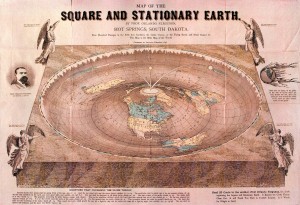Part IV- Four Questions – Does Evolution lead to atheism & genocide
Part IV- Four Questions –A Follow Up Question
This articles is part of a series covering questions that were given to a University student at a young-earth Christian college. This is the answer to a follow up question. Parts 1-3 covered his initial four questions. Earlier articles can be found here – Article 1 (How long are the days in Genesis?), here – article 2 (How Olds is the Earth? Do man and apes share common ancestors) & here – article 3 (What about Adam & Eve).
The Question – “As I am sure you all know, one of the biggest things that Biblical creationists believe is that an evolutionary world view will lead to a secular world-view (rejecting God) and the devaluing of Human life, leading to genocide, eugenics, abortion, etc. What would be your response to this?”
Let’s start with the term “Biblical Creationist”.
The largest young-earth organization has been advocating for the use of this term as a replacement for young-earthist or young-earth creationist. I find this term to be even more misleading then creationist. The term “Biblical Creationist” as a euphemism for young-earth anti-evoluionary creationism implies that young-earthism is more biblically based than a traditional view that God is the author of all creation, including evolution.
Most of the worlds Christians belong to denominations that explicitly do not accept young-earthism. Nearly all young earth denominations originated in America in the last couple of hundred years. Arguably, young earthism is a new doctrine, containing a number of claims on the correct interpretation of the Bible that are not shared by most Christians now and have not been historically. Some elements of young -earthism, such as the idea that evolution has proceeded at a very rapid clip since Noah’s flood are less than twenty years old and require what most would see as very tortured hermeneutics and science. Thus, the claim that young earthists are the biblical creationists is very unlikely and misleading.
Secondly, the ideas that anti-evolutionaries are the creationists and that creationism can be seen as opposed to evolution are also extremely misleading. Christians and other theists are by definition creationists. Most of us accept that evolution has been very well evidenced as a mechanism of creation. Allowing young-earth proponents to refer to their idea as “creationism” or “biblical creationism, unchallenged would be no different than allowing one of the groups of geocentricism and flat earth supporters to claim that all other Christians who accept that the earth is moves around the sun are not biblical or are not creationists.
Now I’ll move to this statement [we believe] “that an evolutionary world view will lead to a secular world-view (rejecting God).”
An acceptance of evolution can lead to rejection of God. When a person is told that for the Bible to be correct and for Christianity to be true they must believe that evolution is not true and then finds the weaknesses in anti-evolutionary hypothesis, they may conclude that Christianity is not true. This appears to be due to an impoverished theology of creation that has been propagated. The anti-evolutionary movement may be the strongest weapon and greatest ally of the new, more evangelistic form of atheism. It’s ironic as when geologists discovered that the earth was ancient it dealt what was seen at the time as a death blow to atheism, by pointing out that the earth had a beginning.
An atheist sees an act of nature and believes that there is no deity involved in that act. An anti-evolutionary creationist can see an act of nature and also conclude that God did not do it. Neither is a biblical position.
Anti-theists and anti-evolutionaries both claim that if we have a natural explanation for how species diversify (evolution) or originate (abiogenesis) that God is eliminated from consideration or necessity. What they are both missing is that we have long had natural explanations for basic laws of physics, how weather patterns originate and many other things that were once explained only by “God did it” and that Christians have long been unconcerned by this.
Most Christians have long believed that the natural explanation is the immediate cause and God is the ultimate cause for these. Thomas Aquinas wrote volumes on proximal (natural) and ultimate (God) causes. Why would evolution or abiogenesis be any different? We see God as creating and maintaining these systems and working through them. The Bible teaches us that God knits us in the womb, yet we know the naturalistic processes which occur, from fertilization through to birth. Few would claim that knowing how human babies happens means God is not necessary for the process or involved in the process. We hold that God is the author and maintainer of child birth. Science, the study of God’s creation, tells us how evolution and childbirth happen. We have faith that God is the ultimate cause.
Anti-theists and anti-evolutionaries think that science and our faith are in conflict. We see them as different and complementary. The Bible has given us the theological perspective, whereas science simply tells us the mechanics. We need to see evolution in the same way; the theological perspective is creation, the scientific perspective is evolution, and these complement one another.
Many Christians and other theists today and throughout the history of the theory of evolution have accepted it. In fact, the majority of Christian denominations have either supported it or simply said that the theory of evolution, while interesting, is not of direct concern to Christianity. This linked article includes the doctrinal statements regarding evolution of some of the major historic branches of Christianity. Denominations that have no problem with the theory of evolution include most traditional and many younger Protestant churches, the Catholics, the Orthodox and the Anglican church. These represent the vast majority of Christians. The vast majority of Christians do not appear to becoming atheist. The statement “an evolutionary world view will lead to a secular world-view (rejecting God) an the devaluing of Human life, leading to genocide, eugenics, abortion, etc.” would lead one to believe that most Christian churches have a secular world view that leads to devaluing human life. Most Christians would beg to differ.
Many of the biologists today and historically are Christians or of other religious faiths. In addition, some of the most prominent biologists have been Christians. The percentage of biologists of all philosophies and religions that accept evolution is well above 99%. Are all biologists that are Christians or of another religious faith secret atheists? Are they all on a path to atheism? Many folks, myself included, were attracted to God, in part by awe and wonder at biology and most particularly the evolutionary mechanism. It would appear that acceptance of evolution does not necessarily leads to atheism.
What about the claim that acceptance of evolution [leads to] “the devaluing of Human life, leading to genocide, eugenics, abortion, etc.?”
I can’t help but think that is a truly weak argument. We don’t reject the evidence of God’s works, because we fear how people may misuse them. We don’t claim that chemistry is untrue and attempt to build a replacement, because Nobel created explosives. People use gravity to commit suicide or murder. Their actions do not make gravity less true.
Given that young-earthism often leads to atheism, would you then say that young earthism led to Stalin’s genocide? Classical logic would label this “an associative fallacy.” It’s a matter of arguing that because two things share a property they are the same. One might argue that chickens are yellow and the sun is yellow, thus the sun is chicken. My particular atheist friends strongly support democracy. It would be as easy and as meaningless to say “democracy is atheistic.” Some Christians supported Hitler. Following this same thought pattern one could argue that “Christianity is Fascist and leads to genocide.” One needs a great deal more support for linking two ideas than a mere fact that some or even all supporters of an idea also accept another one. Algebra is not “atheistic” because it is practiced and accepted by most atheists.
One could argue that evolutions precepts lead to atheism. However, you might first want to check into the thoughts of generations of scientists and theologians who feel that evolution leads them to worship God. If an idea inevitably leads to a given outcome, you’d need to track and prove that beyond illustrations.
Conclusion
Evolution is a scientific premise, not a religious or philosophical premise. While many of us like to draw metaphysical musings, philosophy, artistic notions and religious conclusions based on the mechanisms of biological change, the theory of evolution itself does not make non-tangible predictions. Where ones philosophy or faith makes material predictions they may be disproved by science, but science is generally unable to speak to non-testable concepts like the value of human life, morality or the existence of our creator. We simply cannot say “evolution means God doesn’t exist” or “humans aren’t valuable and to be loved” based on the scientific premise, without adding theology or philosophy to it.
The idea that acceptance of evolution “will lead to a secular world-view (rejecting God) and the devaluing of Human life, leading to genocide, eugenics, abortion, etc.” does not appear to be supported. It appears to simply arise from fear, or perhaps demagoguery.
“God has not given us a spirit of fear, but of power and of love and of a sound mind.” 2 Timothy 1:7
Category: Four Questions, Theistic Evolution




